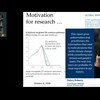kvantitativa
Studying mechanisms to strengthen causal inferences in quantitative research
Pp. 319 – 335 in J. M. Box-Steffensmeier, H. E. Brady and D. Collier (eds.) in The Oxford Handbook of Political Methodology. Oxford: Oxford University Press.

Magnus Bygren
I am professor in Sociology at Department of Sociology, Stockholm University. My research currently aligns with three overlapping themes: (1) the existence and degrees of discrimination within differen
Catastrophic risk
in Philosophy Compass (2020) Abstract:Catastrophic risk raises questions that are not only of practical importance, but also of great philosophical interest, such as how to define 'catastrophe' and wha

Julia Steinberger: Is it possible to live well within planetary limits? Evidence and modelling from the LiLi project
Professor Julia Steinberger researches and teaches in the interdisciplinary areas of Ecological Economics and Industrial Ecology. Her research examines the connections between resource use (energy and

Lucia Karens
I have a bachelor's degree in Engineering Physics. I am currently finishing my Master's degree in Machine Learning. At the Institute for Futures Studies, I work as a research assistant for the project E, led by . The aim of the project is to investigate how stereotypes about minority and immigrant groups have evolved over time in Sweden and Finland, by analysing several decades' worth of newspaper articles. My main tasks are running the quantitative analysis of the data with various machine learning methods, as well as visualizing the results.
Episodes of liberalization in autocracies: a new approach to quantitatively studying democratization
Political Science Research and Methods, 1-20 Abstract This paper introduces a new approach to the quantitative study of democratization. Building on the comparative case-study and large-N literature, it
The Transition to Adulthood and the Ambivalence of Desistance
In: The Routledge International Handbook of Life-Course Criminology, eds. Arjan Blokland & Victor van der Geest, pp. 324—341. London: Routledge. The Routledge International Handbook of Life-Course
Women in violent extremism in Sweden
Nordic Council of Ministers, 54 pages Women have generally been treated as “side shows” in the literature on war,terrorism and violent extremism and have thus been given scant scholarly attention.In mato be framed as unwitting, passive agents or brainwashed victims pulled into violentextremist movements only through the relations of their husbands, boyfriends, orfathers.

Sebastian Krakowski
I obtained my Ph.D. at the University in Geneva in February 2020 with my dissertation entitled Artificial intelligence in organizations: Strategy and decision making in the digital age. My research pri

Hernan Mondani
I am an Associate Professor in Sociology and Senior Lecturer in Criminology at the Department of Police Work, Södertörn University, as well as a researcher at the Institute for Futures Studies and Sto








